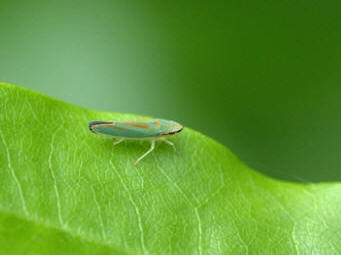Leafhoppers - as their name suggests - will hop about when disturbed on plants.
They are one of the sap-sucking insects and as such are capable of transmitting diseases from plant to plant. No great visual damage done but need to be controlled.
The classic symptoms of leafhopper damage, is pale flecks on the leaves of Chrysanthemums, Pelargoniums and Primulas. Other plant may also be affected. The damage caused is insignificant, though the little bugs are capable of spreading viruses from plant to plant - especially the case with Chrysanthemums and Pelargoniums and increasingly, a fungal disease to rhododendrons and azaleas.
Small green bugs - quite lively when disturbed - often found on the underside of leaves and their cast of skins are often mistaken for whitefly cast-offs.
They are increasingly becoming severe pests in USA particularly on potato and Alfalfa crops. In this instance they can be treated with a contact pesticide containing Bifenthrin or a systemic insecticide such as Provado.
Leafhoppers are sometimes confused with frog hoppers, but one of the many differences is that they do not 'cocoon' themselves in the unsightly blob of spittle!
Part of their life cycle is the fact that thee adults lay their eggs within the plant - impregnating their clutch just under the outer skin under the leaves.

There is no control other than chemical that we are aware of but the good side being that they rarely cause long term damage to the plant.
If there is severe infestation, then a systemic insecticide may be the best answer.
There are several different types of leaf hoppers - all having the same characteristics; all being sap suckers and all capable of several generations throughout the year.
As well as Chrysanthemums, the members of the herb Sage family are particularly susceptible to infestation. This is particularly so with the herb types rather than the ornamental Salvia group.
Main Page for Apple Tree Problems